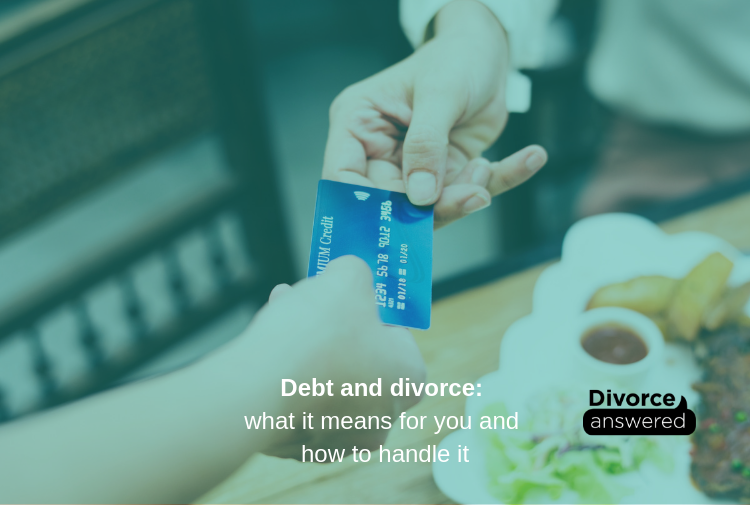
Debt. No one likes having it. Debt doesn’t disappear. Owing someone or an organisation money can weigh heavily upon you and your budget.
Personal experience with debt and establishing financial independence
When I separated, we had a bit of debt. We had a little in the bank accounts, credit card debt, mounting personal loans and some urgent repairs to attend to. The cash in our account was joint and the debt that needed paying off was also joint.
I realised that I needed to physically separate my finances from my ex’s so that we could create some element of independence. I went to the bank to try to remove my ex from my accounts and there seemed to have been a bank error where he wasn’t made a secondary but a co-owner of the account. As such, I had to remove myself from the account that I had owned since I was 8 years old.
In an attempt to separate financially, I used the funds in our joint account to pay off the credit card, pay for the most urgent repair and pay whatever bills were due. This left nothing in our account and some personal loans to attend to.
Understanding that my ex’s wage would go into what was our joint bank account, I knew that he would have access to funds after paying whatever I could. With that, I cancelled the credit card and started a fresh with a new one which was for me alone.
The steps that I took may not have been legal or appropriate at the time or now.
I was trying to do what I thought was right at the time – clearing debt that was for the family when we were a family by using family funds – with the limited information available to me.
Interesting facts about debt
• When you have debt (say, joint mortgage, credit cards or loans) with the bank, you cannot remove your name from the liability unless it is all paid out or you have a Court Order to either assume or remove your responsibility
• Debt accrued in separation can be included in the financial settlement
• Debt that remains unpaid can affect your credit rating and ability to borrow in the future?
How you can manage your sole debt
There are many ways to manage your debt. The most important first step is to create a budget. This is essential information for understanding how much income you are earning or receiving and how much your outgoings/expenses are. If you don’t know how to start your budget, use the Divorce Answered Budget Tool – it is saved online so that you can keep working with the one form and adjusting it as necessary or as your bills come in.
Once you have an understanding of your financial position with thanks to the budget tool, you can move forward with addressing the debt by:
Managing joint debt
Debt in two or more names is considered joint debt. This means that you are both equally liable for the debt. If the debt isn’t paid, then it can become difficult for you and your credit rating may become affected.
Some suggestions for managing joint debt include:
Remember, banks and other providers that you have debt with cannot be named parties on the Court Orders (for example the Orders can’t enforce your Bank to divide the liability of the debt to each party by 50%.) What the Order can state is the responsibility to meet the payments is to Person A or Person A is responsible for 50% of the nominated debt.
Debt and your financial settlement
When it comes time to assess your financials for settlement, all assets and liabilities (or debts) are taken into consideration. In many cases, large debts or loans, like a mortgage, may be paid out when a property is sold or taken on by one of the couple. However, in some relationships there is a significant amount of debt. In these cases, there aren’t sufficient assets or cash to payout the debt and the financial settlement becomes a situation of what percentage of debt each individual takes. If you find yourself in the latter situation or considering on taking on any loans, mortgages or liabilities, talk to your bank, accountant and financial advisor so that you know what you are approved to encumber before entering into any negotiations.
A last resort: Bankruptcy
If all else fails, you could consider declaring bankruptcy – however, this comes with caution. There are repercussions that you need to be aware of before you proceed down this path. If you declare bankruptcy, you will:
• not be able to own a car over a certain value
• not be able to be a director of a company for a certain period
• not be able to own tools over a certain value
• not have debt owed to lawyers and child support excused
• and so much more!
Declaring yourself bankrupt is a huge commitment and one that should never be taken lightly. Seek appropriate financial and legal advice before proceeding.
It’s important for you to address all debt - be it joint or sole and from during or after the relationship – and always have a plan and budget for making repayments. Most importantly, seek professional assistance (lawyer, accountant, financial advisor and/or bank) as well as talking to talk with your ex-spouse as necessary and required for your situation to tackle any debt, ensure payments are made and that you are regularly reducing your liability.
Related articles: Financial settlements and debt: read this first
Separation + Work = Financial Independence